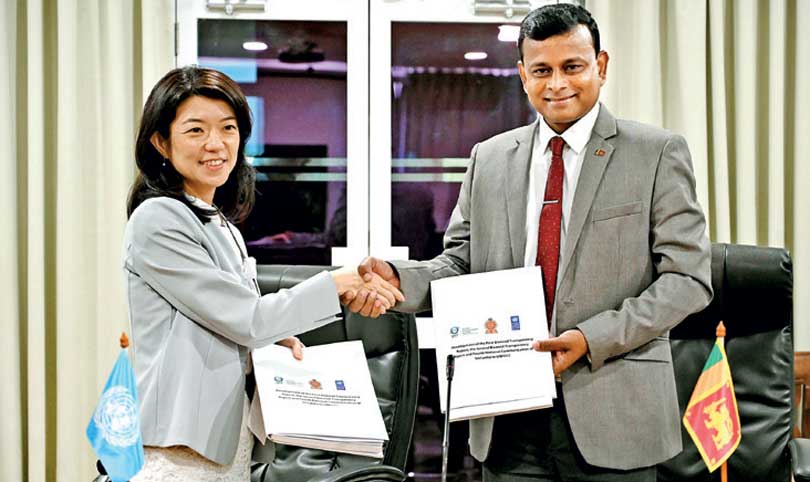Sunday Feb 22, 2026
Sunday Feb 22, 2026
Tuesday, 13 August 2024 00:24 - - {{hitsCtrl.values.hits}}

Environment Secretary Prabath Chandrakeerthi and UNDP Sri Lanka Resident Representative Azusa Kubota exchange the agreement
2024 marks a critical year for climate transparency as Parties to the Paris Agreement are required to submit their first Biennial Transparency Report (BTR 1) by 31 December 2024 under the Enhanced Transparency Framework of the Paris Agreement.
As a signatory to the Paris Agreement, Sri Lanka is also obligated to submit its BTR to the United Nations Framework Convention on Climate Change (UNFCCC). The Global Environment Facility (GEF) funded “Development of the First Biennial Transparency Report, the Second Biennial Transparency Report and the Fourth National Communication of Sri Lanka to UNFCCC” project is to be implemented by the Environment Ministry together with the United Nations Development Programme (UNDP) in Sri Lanka, to support the Government to prepare the First and Second Biennial Transparency Reports and the Fourth National Communication.
To mark the launch of the project, the Project Document signing took place with the participation of Environment Secretary Prabath Chandrakeerthi, and UNDP Sri Lanka Resident Representative Azusa Kubota along with other representatives from the Environment Ministry and UNDP.
Chandrakeerthi said: “We recognise the importance of submitting the BTRs and national communications, not only as a demonstration of our commitment to achieving the targets under the Paris Agreement but also to showcase our progress and strengthen our efforts to combat climate change. It represents our dedication to enhanced transparency, accountability, reinforcing global cooperation to address this urgent challenge.”
UNDP in Sri Lanka Resident Representative Azusa Kubota said: “As we have been a technical partner to the Nationally Determined Contributions (NDCs) for Sri Lanka in the past, we are very pleased to support the Government to translate their climate action on the ground towards net zero and SDG13. As Sri Lanka prepares to update the third iteration of their NDCs, this process will be instrumental to identify potential gaps and areas to ramp up the country’s ambition in mitigating and adapting to climate change.”
This initiative sets the stage, demonstrating Sri Lanka’s dedication to transparency and accountability while providing an opportunity to evaluate and strengthen climate targets, as Sri Lanka moves towards climate resilient, net zero development pathways in the country.